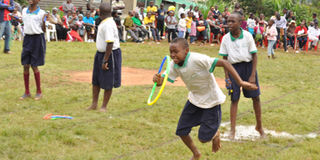Questions raised on teachers' readiness for new curriculum

A school’s sports day. There are very few parents who do not wish to make their children’s lives easier than they had when they were growing up. The rollout of the new curriculum faces challenges with one in every five teachers saying they are not prepared to implement it next year. PHOTO | FILE | NATION MEDIA GROUP
What you need to know:
Parents are also not fully aware of their role, notes the report by curriculum development agency.
Only 20 per cent of teachers are adequately prepared for curriculum rollout next year, report reveals.
The curriculum was to be rolled out in January this year, but was postponed to allow for more national piloting programmes.
The rollout of the new curriculum faces challenges with one in every five teachers saying they are not prepared to implement it next year.
The Kenya Institute of Curriculum Development (KICD) in its May report also says parents, who will be expected to play a key role in the implementation of the competency-based curriculum are not fully aware of their role.
“Over half, 57 per cent, of the teachers indicated that they felt prepared for the implementation of the competence based curriculum,” reads the report.
LACK KNOWLEDGE
It states that only three per cent of the teachers said they were “very well prepared” while only 20 per cent said they were “well prepared”.
“Thirteen per cent reported that they were “hardly prepared while seven per cent said they were “not prepared at all,” the report notes.
The curriculum was to be rolled out in January this year, but was postponed to allow for more national piloting programmes after it emerged that teachers were not prepared then.
The report notes that teachers lack knowledge in assessment of students and preparation of scheme of work in line with the new format.
CONTENT OVERLOAD
“The observations also brought to the fore the coverage of many concepts in some of the lessons. This practice could reverse gains being made on the focus on abilities rather than loading learners with knowledge. This should be discouraged as the reforms aim at engaging learners in applying knowledge through demonstration, as opposed to content overload,” reads the report.
The report appears consistent with the findings of a recent report by the Teachers Service Commission (TSC), which raised concerns over the low level of mastery and understanding of subjects by teachers.
The TSC report, which was presented during the Kenya Secondary School Heads Association conference in Mombasa, indicated that 27 per cent of teachers do not fully understand the subjects they teach.
There are 312,060 teachers across the country for both primary and post primary schools.
AVERAGE SCORE
The reservations are also supported by a World Bank report released in April during the Pan-African High-level Conference on Education in Nairobi, which indicated that mathematics and language teachers were unable to score 100 per cent from Grade 4 work.
It indicated that teachers tested on Grade 4 English work had an average score of 63 per cent while in mathematics, the average score was 77 per cent.
According to the KICD report, dubbed Monitoring Report on the National Pilot of the Competency Curriculum, teachers are still using the old syllabus and some classes are congested.
INDIVIDUAL ABILITY
“Other findings for lessons improvement following the lesson observation include the use of relevant aids. The observations registered responses that highlighted gaps in teacher capacity to develop and use up-to-date charts. The charts in the classes were old and could not support learning effectively,” reads the report, which has since been submitted to Education Cabinet Secretary Amina Mohamed.
It goes on: “During class observation, findings revealed teacher capacity gap in conducting and recording continuous assessment. Given the role of assessment as an integral part of learning, the concerns that have been raised should be addressed. The findings showed that there were chorus answers in some classes. This implies teachers did not exhibit the ability to gauge learner’s individual ability.”
It adds that teachers are having difficulties in interpreting curriculum designs and subsequent preparation of scheme of works and lesson plans.
TRAINING SESSIONS
The target population for the study comprised all public and private lower primary schools in Kenya.
The study targeted all pre-primary, grade one, two and three teachers in the 2017 pilot primary schools, headteachers and all learners in public and private early years education.
The study also targeted all county directors of education, curriculum support officers and parents who had children in early years education level.
The report recommends that KICD plans for more training sessions to bridge capacity gaps highlighted in pedagogy, assessment and preparation of teaching documents.
FULL PARTICIPATION
“Other areas like differentiated curriculum and learning, community service learning and development of learning materials should also be addressed,” recommends the report.
It also wants the Education ministry to ensure the relevant teaching and learning materials are made available in schools in adequate quantities while teachers should be encouraged to be creative and use the locally available materials in teaching and learning.
KICD has also been advised to review learning activities to make them more suitable and allow full participation particularly for students with special needs.





